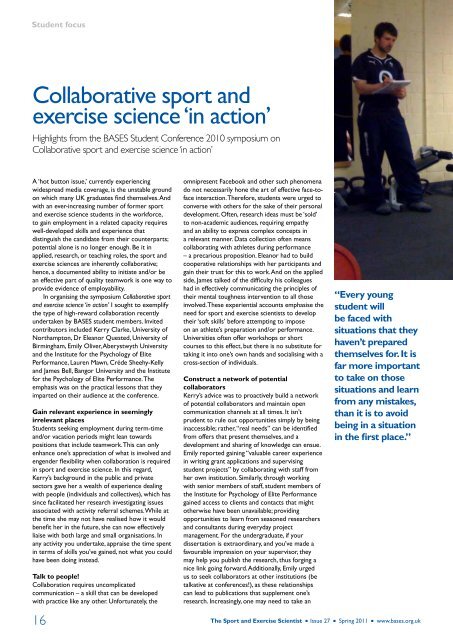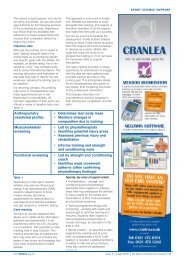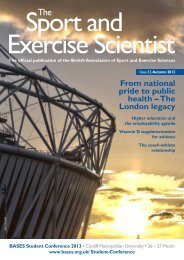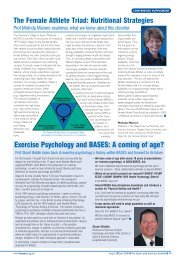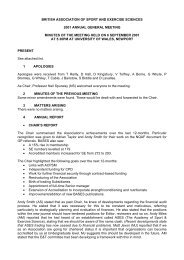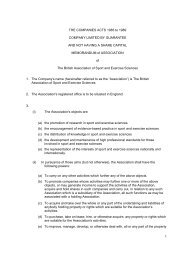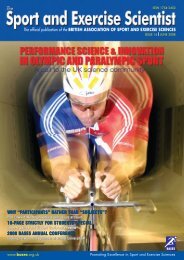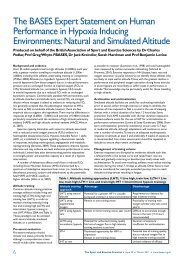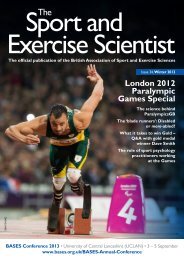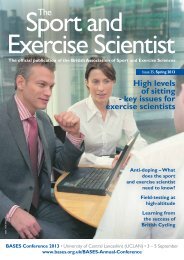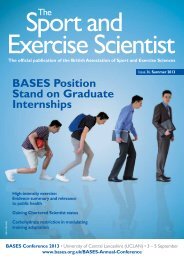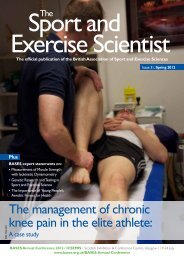The Sport and Exercise Scientist Issue 27, Spring 2011 - BASES
The Sport and Exercise Scientist Issue 27, Spring 2011 - BASES
The Sport and Exercise Scientist Issue 27, Spring 2011 - BASES
- No tags were found...
Create successful ePaper yourself
Turn your PDF publications into a flip-book with our unique Google optimized e-Paper software.
Student focusCollaborative sport <strong>and</strong>exercise science ‘in action’Highlights from the <strong>BASES</strong> Student Conference 2010 symposium onCollaborative sport <strong>and</strong> exercise science ‘in action’A ‘hot button issue,’ currently experiencingwidespread media coverage, is the unstable groundon which many UK graduates find themselves. Andwith an ever-increasing number of former sport<strong>and</strong> exercise science students in the workforce,to gain employment in a related capacity requireswell-developed skills <strong>and</strong> experience thatdistinguish the c<strong>and</strong>idate from their counterparts;potential alone is no longer enough. Be it inapplied, research, or teaching roles, the sport <strong>and</strong>exercise sciences are inherently collaborative;hence, a documented ability to initiate <strong>and</strong>/or bean effective part of quality teamwork is one way toprovide evidence of employability.In organising the symposium Collaborative sport<strong>and</strong> exercise science ‘in action’ I sought to exemplifythe type of high-reward collaboration recentlyundertaken by <strong>BASES</strong> student members. Invitedcontributors included Kerry Clarke, University ofNorthampton, Dr Eleanor Quested, University ofBirmingham, Emily Oliver, Aberystwyth University<strong>and</strong> the Institute for the Psychology of ElitePerformance, Lauren Mawn, Créde Sheehy-Kelly<strong>and</strong> James Bell, Bangor University <strong>and</strong> the Institutefor the Psychology of Elite Performance. <strong>The</strong>emphasis was on the practical lessons that theyimparted on their audience at the conference.Gain relevant experience in seeminglyirrelevant placesStudents seeking employment during term-time<strong>and</strong>/or vacation periods might lean towardspositions that include teamwork. This can onlyenhance one’s appreciation of what is involved <strong>and</strong>engender flexibility when collaboration is requiredin sport <strong>and</strong> exercise science. In this regard,Kerry’s background in the public <strong>and</strong> privatesectors gave her a wealth of experience dealingwith people (individuals <strong>and</strong> collectives), which hassince facilitated her research investigating issuesassociated with activity referral schemes. While atthe time she may not have realised how it wouldbenefit her in the future, she can now effectivelyliaise with both large <strong>and</strong> small organisations. Inany activity you undertake, appraise the time spentin terms of skills you’ve gained, not what you couldhave been doing instead.Talk to people!Collaboration requires uncomplicatedcommunication – a skill that can be developedwith practice like any other. Unfortunately, theomnipresent Facebook <strong>and</strong> other such phenomenado not necessarily hone the art of effective face-tofaceinteraction. <strong>The</strong>refore, students were urged toconverse with others for the sake of their personaldevelopment. Often, research ideas must be ‘sold’to non-academic audiences, requiring empathy<strong>and</strong> an ability to express complex concepts ina relevant manner. Data collection often meanscollaborating with athletes during performance– a precarious proposition. Eleanor had to buildcooperative relationships with her participants <strong>and</strong>gain their trust for this to work. And on the appliedside, James talked of the difficulty his colleagueshad in effectively communicating the principles oftheir mental toughness intervention to all thoseinvolved. <strong>The</strong>se experiential accounts emphasise theneed for sport <strong>and</strong> exercise scientists to developtheir ‘soft skills’ before attempting to imposeon an athlete’s preparation <strong>and</strong>/or performance.Universities often offer workshops or shortcourses to this effect, but there is no substitute fortaking it into one’s own h<strong>and</strong>s <strong>and</strong> socialising with across-section of individuals.Construct a network of potentialcollaboratorsKerry’s advice was to proactively build a networkof potential collaborators <strong>and</strong> maintain opencommunication channels at all times. It isn’tprudent to rule out opportunities simply by beinginaccessible; rather, “real needs” can be identifiedfrom offers that present themselves, <strong>and</strong> adevelopment <strong>and</strong> sharing of knowledge can ensue.Emily reported gaining “valuable career experiencein writing grant applications <strong>and</strong> supervisingstudent projects” by collaborating with staff fromher own institution. Similarly, through workingwith senior members of staff, student members ofthe Institute for Psychology of Elite Performancegained access to clients <strong>and</strong> contacts that mightotherwise have been unavailable; providingopportunities to learn from seasoned researchers<strong>and</strong> consultants during everyday projectmanagement. For the undergraduate, if yourdissertation is extraordinary, <strong>and</strong> you’ve made afavourable impression on your supervisor, theymay help you publish the research, thus forging anice link going forward. Additionally, Emily urgedus to seek collaborators at other institutions (betalkative at conferences!), as these relationshipscan lead to publications that supplement one’sresearch. Increasingly, one may need to take an“Every youngstudent willbe faced withsituations that theyhaven’t preparedthemselves for. It isfar more importantto take on thosesituations <strong>and</strong> learnfrom any mistakes,than it is to avoidbeing in a situationin the first place.”16 <strong>The</strong> <strong>Sport</strong> <strong>and</strong> <strong>Exercise</strong> <strong>Scientist</strong> n <strong>Issue</strong> <strong>27</strong> n <strong>Spring</strong> <strong>2011</strong> n www.bases.org.uk


